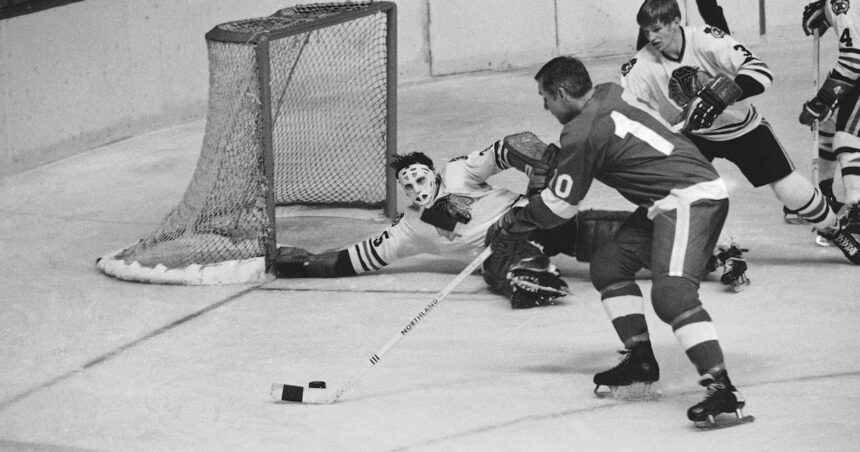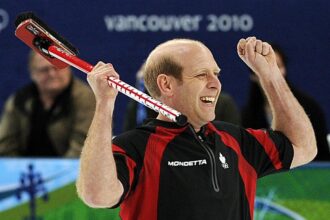In the quiet hours of a July morning, the hockey world lost one of its most enduring legends. Alex Delvecchio, the Detroit Red Wings icon whose career spanned three decades and whose gentlemanly conduct became as legendary as his on-ice prowess, has died at age 93. The news, confirmed by the Red Wings organization early today, has sent ripples of reflection through the sporting community and beyond.
Delvecchio’s story isn’t just one of athletic achievement—though with three Stanley Cups, over 1,500 games played (all with Detroit), and a Hall of Fame induction in 1977, those achievements stand tall. His story is one that transcends sport itself, speaking to values of loyalty, perseverance, and grace that seem increasingly rare in our modern sporting landscape.
“What made Alex special wasn’t just the points or the championships,” explains former Red Wings captain Henrik Zetterberg, who often spoke of Delvecchio’s influence. “It was that he represented something timeless about hockey—about doing things the right way, about representing a team and a city with dignity.”
Indeed, in an era where player movement between teams has become commonplace, Delvecchio’s 24-year career with a single franchise feels almost mythological. The center was part of the famed “Production Line” alongside Gordie Howe and Ted Lindsay, creating one of hockey’s most formidable offensive units during Detroit’s golden era of the 1950s.
What’s particularly striking about Delvecchio’s legacy is how his playing style mirrored his personality. In 1,549 regular-season games, he amassed just 383 penalty minutes—an astonishingly low number that speaks to his clean, technical approach to a sport often celebrated for its physicality. Three times he won the Lady Byng Trophy for sportsmanship and gentlemanly conduct, cementing a reputation that would follow him into his post-playing career as coach and general manager.
The statistics tell only part of the story. Those who knew Delvecchio speak of his accessibility, his ready smile, and his commitment to the Detroit community long after his playing days ended. In an age where athletes often seem separated from fans by layers of management and media, Delvecchio represented a more direct connection between player and public.
Hockey historian Paul Grant notes that “Delvecchio played in an era before enormous salaries and endorsement deals, when players lived in the same neighborhoods as fans and often worked second jobs in the off-season. That reality shaped a generation of players who understood their connection to community in visceral ways.”
His death marks the passing of one of the last links to hockey’s Original Six era, a period remembered for its purity and passion before expansion changed the league forever. Only a handful of players from that golden age remain, each carrying memories of a sport that has transformed dramatically in both style and substance.
For Canadians especially, Delvecchio’s passing touches something deeper than sport. Hockey’s place in our cultural identity remains complex and evolving, but figures like Delvecchio represent connections to a shared heritage that transcends regional and linguistic divides.
The tributes pouring in from across the hockey world—from contemporary stars to coaching legends—speak to Delvecchio’s impact across generations. Though many young fans may never have seen him play, his influence persists through the social trends he helped establish in professional sports: loyalty to team, respect for opponents, and engagement with community.
As we reflect on Delvecchio’s remarkable life and career, perhaps the most fitting tribute isn’t simply to remember what he accomplished, but how he accomplished it. In an era increasingly defined by momentary viral fame and constant reinvention, his steadfast commitment to excellence and integrity offers a different model of achievement—one built on consistency rather than spectacle.
The number 10 jersey that Delvecchio wore for decades hangs in the rafters at Little Caesars Arena, but his true legacy lives in the memories of those who watched him play, the stories passed between generations of fans, and the values he embodied both on and off the ice. As the hockey community mourns his passing, we’re reminded that some achievements transcend statistics and championships, residing instead in the lasting impact one life can have on countless others.
In the end, perhaps that’s the most meaningful measure of any career, athletic or otherwise: not just what you accomplished, but what you represented. By that standard, Alex Delvecchio’s legacy is secure not just in the Hall of Fame, but in the heart of hockey itself.
For more reflections on sports legends and their cultural impact, visit our opinions section.
























